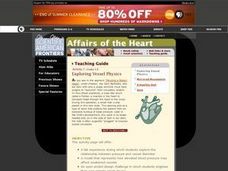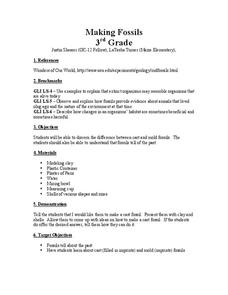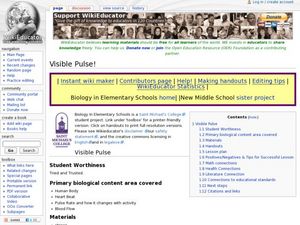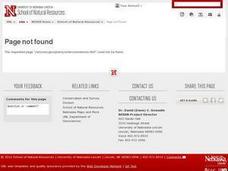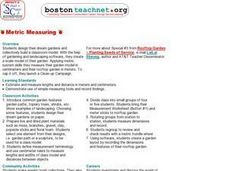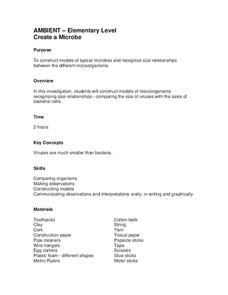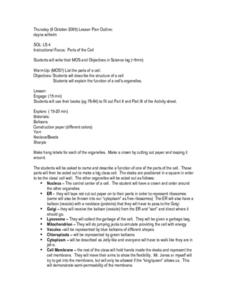Curated OER
Porosity and Permeability
Students examine the concepts of porosity and permeability. They conduct experiments to determine the porosity and permeability of gravel, sand, and clay. After performing the experiments they collect and graph data, comparing the...
Curated OER
Ocean Floor Properties and Near Shore Environments
Students explore and model the characteristics of the ocean floor and near shore environments through in-class demonstrations, laboratory activities, and internet research. They use classroom materials to research the characteristics of...
Curated OER
PBS - Scientific American Frontier:Affairs of the Heart:Teaching Guide:Exploring Vessel Physics
Learners explore the relationship between pressure and vessel diameter. They are given an open-ended design challenge in which they engineer their own remote repair device. Students see a model that represents how elevated blood...
Curated OER
The"Dirt" on Soil
Students examine the three different types of soil and their physical properties. In this soil lesson students design and implement a model of a water treatment plant.
Curated OER
Neuron Creations
Students examine neurons. In this nervous system instructional activity, students build models of neurons in order to study their parts and functions.
Curated OER
Making Fossils
Third graders examine the differences between cast and mold fossils. They discuss geological time and how many fossils are millions of years old, then create a cast fossil using clay and a shell, and a mold fossil using a shell and...
Curated OER
Visible Pulse
Students record their pulse rate. In this circulatory system lesson, students use a piece of clay and a straw to make their pulse move visible and easier to accurately count and record.
Curated OER
Concrete Canoes
Students explore and analyze the relationship of buoyancy and displacement needed to make an object float. They examine various boat designs, then design and build clay and aluminum boats that hold a cargo of marbles.
Curated OER
All About Ants
Students create model ants in order to study the characteristics of insects such as body segments, number of legs, and feelers, as well as how these characteristics serve the insect.
Curated OER
Soil Erosion Demonstrations
Learners conduct experiments demonstrating soil erosion and the benefits of conservation practices. Working in groups, they use topsoil and sand in shallow boxes as models to examine the effects of water on soil and sand with and without...
Curated OER
Feet Are Neat
Students describe several types of bird feet and explain how each type helps a bird survive in its habitat. Students then match birds to their feet and mold bird feet out of clay.
Curated OER
Ocean Currents
Students label the names, relative temperature, distribution, and direction of flow of major ocean currents on a world map. They also explore and model the natural forces that affect the movement of ocean currents through demonstrations...
Curated OER
A Symbol of Myself
Students explore their own uniqueness. In this "getting to know you" lesson, students create a clay symbol representing their own personality traits. Students write a short description of the symbol and why they chose it.
Curated OER
Structure of the Earth
Eighth graders describe and identify the three layers of the Earth. They work together to construct their own earth model. They share their creation with the class.
Curated OER
Our Water Resources
Pupils build a model aquifer to study groundwater zones and water table formation. Students use the models to measure the movement of polluted groundwater.
Curated OER
Earth's History
Seventh graders study the law of superposition by creating models of fossils in layers of rock. They examine how fossils are usually found in sedimentary rock which leads to the study of geologic history in those rocks.
Curated OER
Plate Tectonics: Surface and Subsurface Processes
Eighth graders explore the geological process of plate tectonics. In this plate tectonic instructional activity, 8th graders design, construct and present a working model of a plate tectonics concept. This instructional activity includes...
Curated OER
Metric Measuring
Students design their dream gardens and work together to build a class model. They use software to create a virtual model. They only use metric measurements.
Curated OER
Create a microbe
Learners explore viruses and bacteria. They construct three dimensional models of microorganisms recognizing size relationships by comparing the size of viruses with the sizes of bacterial cells.
Curated OER
Learning Planet Sizes
Pupils utilize the concepts of greater than, less than, and equal to, in order to classify student height, object size, and planet size. They build scale models of the planets based on their discoveries of planet size.
Curated OER
Can You Control Floods
Students assume the role of an engineer or planner. As an engineer or planner they must come up with ideas that can be put into place to control floods. They produce a working model of flood control.
Curated OER
Parts of the Cell
Students examine plant and animal cells to observe the organelles present in the cell, to match the function of each to the organelle on a cell model and to build a model of the plant or animal cell.
Curated OER
Inside Earth
Students study the makeup of the earth, including the core, the mantle and the crust. They compare the temperatures and thicknesses of each layer. In pairs, they make a model of a cross-section of the earth out of modeling clay.
Curated OER
Designing a Fort
Pupils explore the concept of right triangles. In this right triangle instructional activity, students construct a scale model of a tourist attraction similar to Fort Jefferson. Pupils research aerial photos of Fort Jefferson, then...
Other popular searches
- Clay Modeling Sea Stars
- Clay Modeling Sculpture
- Clay Modeling Planets
- Clay Modeling Horses
- Clay Modeling Communities
- Clay Modeling Pigs
- Clay Modeling and Bartholdi




